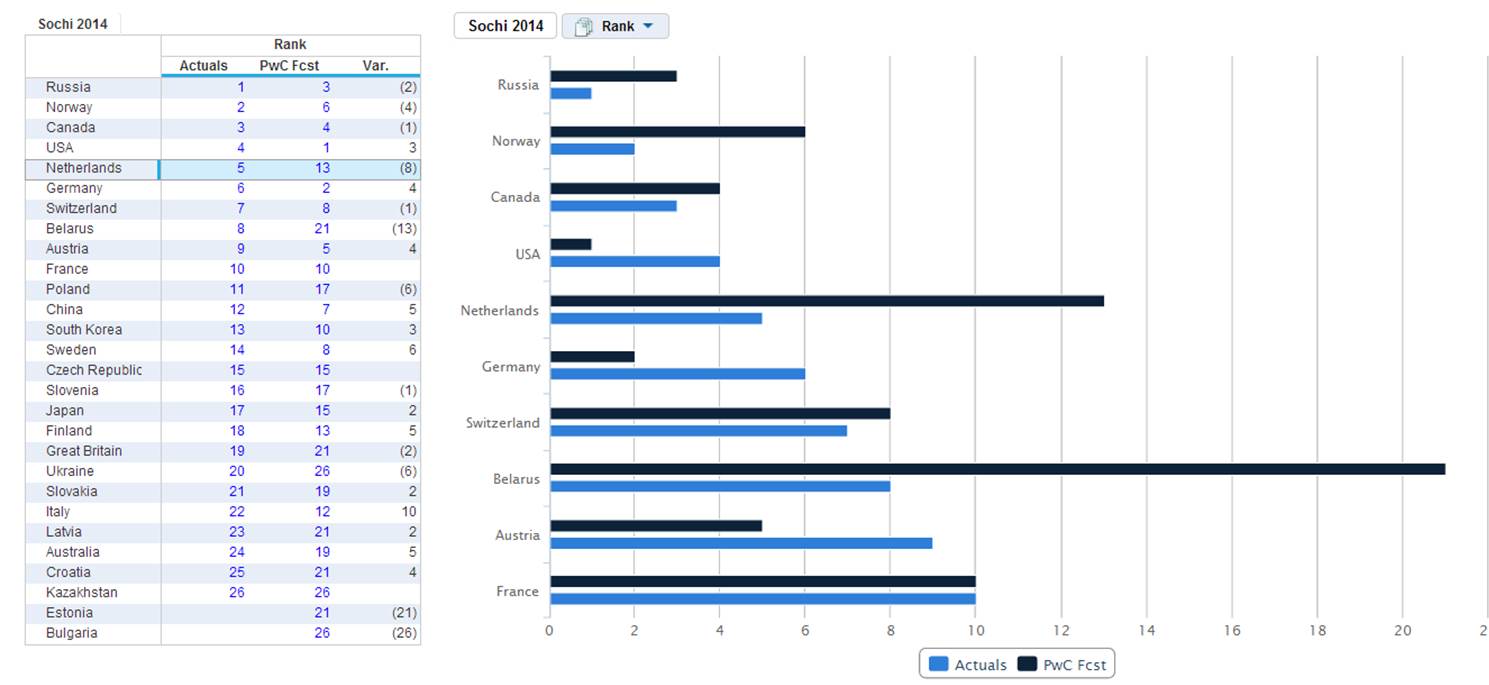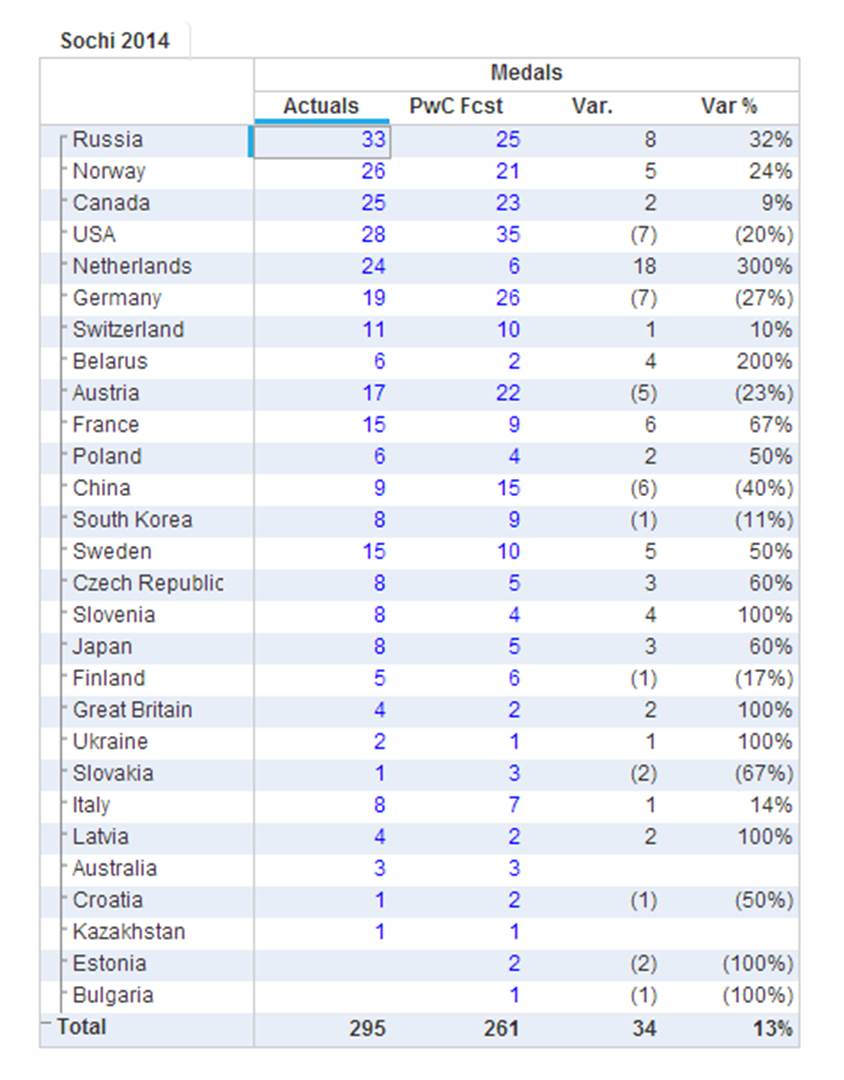Lessons from PWC complete failure @Sochi Medal & rank forecast.
Hi,
Before the OG Sochi2014, PWC released a medal and ranking forecast by using the very same forecasting model that they proposed to their customer for planning and forecasting.
PwC model proves to be a complete failure, at least for the Olympic Games. I cannot say what it looks like for companies, but in my opinion, the results will be alike: same causes and initial mistakes, same results. PwC is basically wrong in it’s approach on how to do planning and forecasting, they have a issue with the structure of their model, not only in the result, the content.
Anaplanners have become highy skilled peoples in planning and forecasting. What can we learn from this PWC failure?
Here are the main variances, and the results why PwC got fully wrong.
Main variances.
Ranking:
Top 3 countries: Russia (PwC=3), Norway (PwC=6), Canada (PwC=4)
PwC only had the USA as first (actual=4th), and Germany as second (actual=6th). They had Russia has 3rd.
Top 5 countries: actuals are Russia, Norway, Canada, USA, Netherland (forecasted at 13th rank by PwC)
PwC had had USA, Germany, Russia, Canada as 4th (actual 2nd) and Austria as 5th (actual=9th).
More than 50% error is quite a big rate! Head and tail would have been a better approximate.
Among the biggest ranking variances we find the following:
• Netherland (actual 5th, PwC 13th)
• Belarus (actual 8th, PwC 21th)
• Italy (actual 22nd, PwC 12th)

Numbers of medals:
Total medals: PwC forecasted 261 medals, actual is 295! Very silly mistake, because it was easy to avoid this 34% variance: 98 games * 3 medals = 294.

Mistake #1: lack of global check and very basic coherence control.
PWC has forecasted 261 medals. The actual number of medal is 295. From the very start, PWC proves wrong because they have not checked the global target versus what was the actual and known potential of the "medal market".
That's a very basic calculation: 98 games * 3 medals = 294. Actual number of medal is 295 because they were 2 athletes winning Gold in one game, thus 294 + 1 = 295.
The very basic check to perform in planning and forecasting is "are my numbers relevant, do they look in line with what can be expected?"
Planning and forecasting is a difficult art in itself because the future is not known. But when PWC doesn't even take into account the very few data that are 100% known, it starts on a weak basis.
Mistake#2: wrong drivers and ignoring the forecast and planning truth: the field will always be right, the Big Brain ideas from offices far away from the field will always be wrong.
The Big Brain at PWC have been using data such as GDP by country, average snow coverage, number of ski resorts, …
LOL.
Any human success comes from the women and men directly in the field, on their ability to perform well on a given day, on motivation, skills. Failures come both from unprepared athletes and also from Big Brain Officers Far Away in their Offices.
This is all the more true for sports successes, which are deeply related on women and on men, not on data. That's true obviously in the world of sport, but that's also true in the business, in companies.
Athletes are winning medals, no one else does.
Reasons for success are women and men working directly in the field, human performance, training, individual specific culture and skills…
Examples of PWC mistakes:
Netherland achieved the 5th rank with 24 medals, even before Germany, while PwC forecasted Netherland to be 13th with 6 medals.
That's ignoring the field reality: the best 28 ice skater in the world are Dutch. The first non Dutch skater is 29th. No surprise that Netherland won 24 medals in Speed Skating at Sochi. In 4 races, the podium was even 100% Dutch. PwC did not look at this level of detail, and based on global country non skating related statistics, they grant NL only 6 medal and rank them on 13th position. Imagine the same kind of mistake in PWC customer sales forecasting…
Basically, Norway, Belarus, France and Russia shared most of the Biathlon medals. There are 300 peoples (yes, three hundred) making biathlon in France versus half a million Norway. Data will say Norway will rule them all. But human skills and motivation do not follow data.
Unpredictable events… but predictable results out of these events
Weather condition can affect the predictions. It has often been the case in Sochi. Fog delaying the Biathlon Mass Start form Sunday where the favorite was at the peak of his shape to next Tuesday when he got sick. On Sunday he would have won, on Tuesday he was second. Never met this kind of situation for a lot of businesses? When you miss the proper time, you miss the sales.
Illness / injuries: Athletes lost the medals they deserve because they were sick or injured. What if your best salesman got sick for a full month?
Political situation: Ukraine winning the Gold Medal in Biathon, the second Gold Medal in Winter OG ever for Ukraine. Civil War Situation in Ukraine was known from a couple of day before the Biathlon race. Nearly all Ukraine athletes leave Sochi except these 4 Biathlon women, two of them coming from the east of Ukraine, 1 from the West of Ukraine, and 1 from Kiev. What the hell do you think they were willing to do? No one could have defeated them on that very day in this very context. Never met a situation alike in business?
What should PWC have done:
Any good consultant in planning and forecasting could have told PWC what to do:
• Build the forecast from the known result of every individual athlete, which means go into the proper level of detail, sport by sport, athletes by athletes.
• Updated the forecast daily, according to actual results of athletes. This require a model which you can update Real Time.
• Take into account unpredictable event as they happen.
• Buy Anaplan, because without a flexible and easy to maintain solution which can handle a very high deep of detail, you cannot perform highly sophisticated and complex forecasting model.
And finally, select good driver: looking at the rankings of World Championships would have been a far better approach than using the GDP, which has nothing to do with results. PWC has overestimated the rank and number of medals of Big GDP country, and has underestimated the rank and number of medals of highly motivated and skilled men and women.
Conclusion
That's the same old story again: the dinosaurs try to forecast future results with old technologies (IBM, SAP, Oracle) and out of date forecasting model (PwC) forced by Big Brain Experts disconnected from the field life upon end users.
Life in 2014 is no longer the dinosaurs' life.
Today's life is flexibility, highly motivated peoples, peoples from the field using easy to use and customizable tools to perform their own forecast.
Kind regards.
Michel


